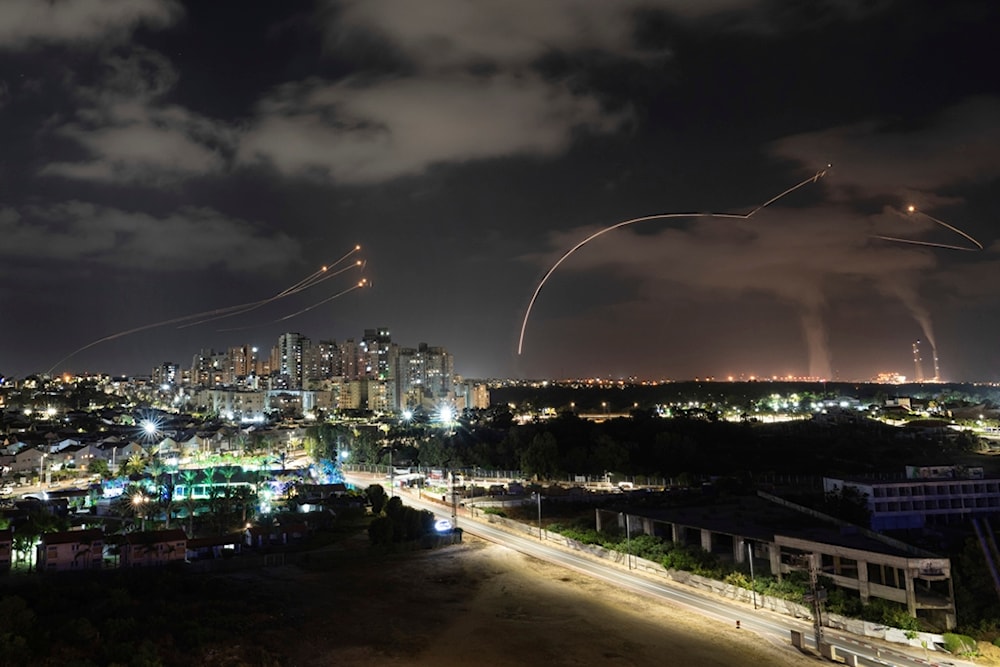Israeli security strategy against Iran: sustainable on the long term?
Without consistent support on the part of the West, the report warns that "Israel" may face a fate similar to that of Ukraine.
-

"Israel's" Iron Dome missile defense system fires interceptors at rockets launched from the Gaza Strip, in "Ashkelon", southern Palestine. Saturday, May 13, 2023. (AP Photo/Tsafrir Abayov)
An op-ed by the Financial Times on Wednesday detailed that "Israel's" security strategy towards Iran's response may not be sustainable in the long run given the regime's over-reliance on Western support.
Without this consistent support, the report warns that "Israel" may face a fate similar to that of Ukraine.
While "Israel" managed to intercept the majority of missiles,
While "Israel", with Western and Arab support, managed to intercept Iranian drones and missiles, questions remain about the regime's ability to sustain such a high level of security, particularly in the event of a major retaliatory strike against Iran.
The situation is drawing parallels with the Ukrainian failures against Russia, as Ukrainian President Volodymyr Zelensky pleads with Western leaders to provide more military assistance.
But "Israel's" potential retaliation against Iran is raising concerns among its allies, particularly the US, UK, and France, which have expressed reluctance to support a military escalation given the apparent minimal damage caused by Iran's initial assault.
The piece also discusses the logistical and strategic challenges facing "Israel" and its allies. "For one, there is a global shortage of interceptor missiles effective against ballistic missile attacks, such as those used in the US-made Patriot and Israel-manufactured Arrow air defense systems," the report says, noting that it may take up to two years to manufacture some of the most sophisticated versions.
The report also states that interceptors are immensely expensive. "One former Israeli military official estimated the cost of Saturday night’s defense at more than $1 billion in expended material, not including what it cost the US, France, and the UK to send jets," the report says.
Competing military priorities are also a factor to consider, given that some within Congress are pushing to allocate more money towards Ukraine.
Read more: Iron Dome failed to intercept all seven hypersonic missiles: Press TV
On Monday, Axios reported that "Israel's" Security Minister Yoav Gallant informed US Defense Secretary Lloyd Austin over the phone about Israeli plans to respond to Iran's recent retaliatory attack.
According to the report, Gallant told Austin that "Israel" will not tolerate the Iranian attack going without a response. It will also not tolerate retaliatory responses every time the regime strikes targets in Syria.
After Iran conducted its retaliatory attack on Sunday, "Israel" was allegedly ready for an immediate attack, but halted operations after US President Joe Biden pressured the regime against initiating a response.
Tehran has consistenlty warned since Sunday that any action on part of "Israel" will be met with a greater response.
'Israel' hasty response to come at hefty cost
On Tuesday, former UK Foreign Secretary William Hague warned against further escalation of tensions between "Israel" and Iran, cautioning that a hasty response by "Israel" could lead to severe consequences.
As hardliners within Netanyahu's extremist cabinet push for an immediate response, Hague warns that their demands are blurring the extent of the potential damage that may ensue from initiating a "crushing" attack, as articulated by Israeli Police Minister Itamar Ben Gvir.
There is an urgent need to consider the broader implications and long-term consequences of any action taken, Hague says.
Central to Hague's argument is the notion of leveraging international support as a strategic asset for "Israel's" survival. Maintaining alliances, bolstering regional security measures, and garnering global backing are essential components in effectively containing Iran, he says.

 4 Min Read
4 Min Read










